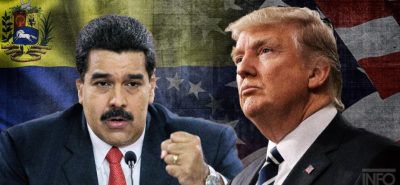Venezuela: Is War on the Horizon? Here’s How Trump’s Poised to Manipulate the Humanitarian Situation in Venezuela

There’s a very high likelihood that the US will commence a limited multilateral invasion of Venezuela if Maduro continues to block the Trojan Horse of a “humanitarian convoy” into his country and the military doesn’t turn against him in the near future because of it.
Russia Hints That War Is On The Horizon
Venezuela’s on the knife’s edge of being the US’ next victim of a forceful regime change after Russian Foreign Ministry spokeswoman Maria Zakharova warned on Thursday afternoon that “Washington already made a decision about a forceful intervention” in the country, which followed Trump’s remark over the weekend that the military “is an option” for dealing with the crisis and his reminder to the world during his recent State of the Union speech of the Bolivarian Republic’s terrible economic situation. Lost amidst Trump’s rhetoric is any mentioning of the fact that the US’ Hybrid War on Venezuela is largely responsibility for triggering the socio-political calamity there, which is now dangerously approaching the scenario of a limited multilateral invasion that the author wrote about last week.
The Trojan Horse
Having had its geopolitical intentions exposed in the global media by Russia, however, the US needs to invent a “publicly plausible” pretext for its next foreign war that could distract the masses from its regime change goals, and therein lays the significance of the rapidly emerging narrative about a so-called “humanitarian intervention”. There’s no question that a humanitarian crisis is unfolding in the country after three million people fled from it in the past couple of years, but the Trump Administration is pressuring Venezuela into accepting a “humanitarian convoy” into its borders, one that could very likely function as a Trojan Horse for either arming anti-government “sleep cells” and/or establishing de-facto foreign control over parts of its territory.
Pompeo’s Pronouncement
Well aware of the threat that this convoy represents, Venezuela blocked the bridge on its border with Colombia’s Cucuta to prevent the Trojan Horse from passing, which is its sovereign right to do as the country’s UN-recognized government. As expected, the US responded by issuing very vague threats to Venezuela in an attempt to pressure it into allowing the convoy to enter its territory, with Secretary of State Mike Pompeo tweeting that
“The Venezuelan people desperately need humanitarian aid. The U.S. & other countries are trying to help, but #Venezuela’s military under Maduro’s orders is blocking aid with trucks and shipping tankers. The Maduro regime must LET THE AID REACH THE STARVING PEOPLE. #EstamosUnidosVE”.
UN = Useless Nations
The UN itself is against politicizing the dispatch of humanitarian aid in what could be interpreted as a rebuke of both the US and Venezuela; the first-mentioned for likely intending to abuse the convoy as a Trojan Horse and the latter for not allowing aid to reach its increasingly desperate population that will undoubtedly experience intensified suffering soon once the economic consequences of Washington’s latest sanctions start to show. Nevertheless, the UN is powerless to shape the course of events that are unfolding at an ever-faster pace than expected, seeing as how the US and its Lima Group allies have total dominance of the conflict’s dynamics at this point in time. Recognizing this, the US is poised to manipulate Venezuela’s humanitarian situation.
Weaponized Narratives
It predictably didn’t succeed in getting Caracas to open up the gates to “wolves in sheep’s clothing”, so the US is attempting to misleadingly reframe the optics of this crisis in a manner that makes it appear as though a “crazy socialist Third World dictator is starving his own people”. The intent behind this is to generate domestic and international support for what might likely be the limited multilateral invasion of Venezuela’s ultra-strategic Zulia state on the interconnected pretexts of “saving its starving population” and “preempting another Migrant Crisis”, the latter of which could be leveraged by Trump to counter the Mainstream Media’s narrative that he “hates” migrants and refugees (especially those from Latin America).
The Anti-Military Psy-Op
Having said that, the US would prefer for its regime change plans to proceed as “peacefully” as possible so that its companies can quickly take over the country’s strategic assets and begin profiting from them right away instead of having to invest lots of capital in rebuilding them after a disastrous civil-international war, so the latest threat of a “humanitarian intervention” is also part of the ongoing psy-op against the Venezuelan military to encourage the desertion of its rank-and-file troops and the defection of its top brass “before it’s too late”. Without the solid backing of the armed forces, Maduro wouldn’t be able to remain in office and the rolling coup against him would assuredly succeed.
Concluding Thoughts
The US’ sudden interest in the humanitarian crisis that it helped to create in Venezuela is for purely self-serving purposes meant to generate a pretext for carrying out its long-planned but limited multilateral invasion of the country, though only if the psy-op against its military doesn’t succeed in deposing Maduro first. The current standoff over the fate of the “humanitarian convoy” is a manufactured drama engineered by the US for the purpose of applying maximum international pressure on Venezuela over its expected refusal to allow that Trojan Horse into its country. Venezuela is now thrown ono the horns of the ultimate dilemma where it’s damned if it opens the gates to the invading force but equally damned if it doesn’t.
*
Note to readers: please click the share buttons below. Forward this article to your email lists. Crosspost on your blog site, internet forums. etc.
This article was originally published on Eurasia Future.
Andrew Korybko is an American Moscow-based political analyst specializing in the relationship between the US strategy in Afro-Eurasia, China’s One Belt One Road global vision of New Silk Road connectivity, and Hybrid Warfare. He is a frequent contributor to Global Research.

